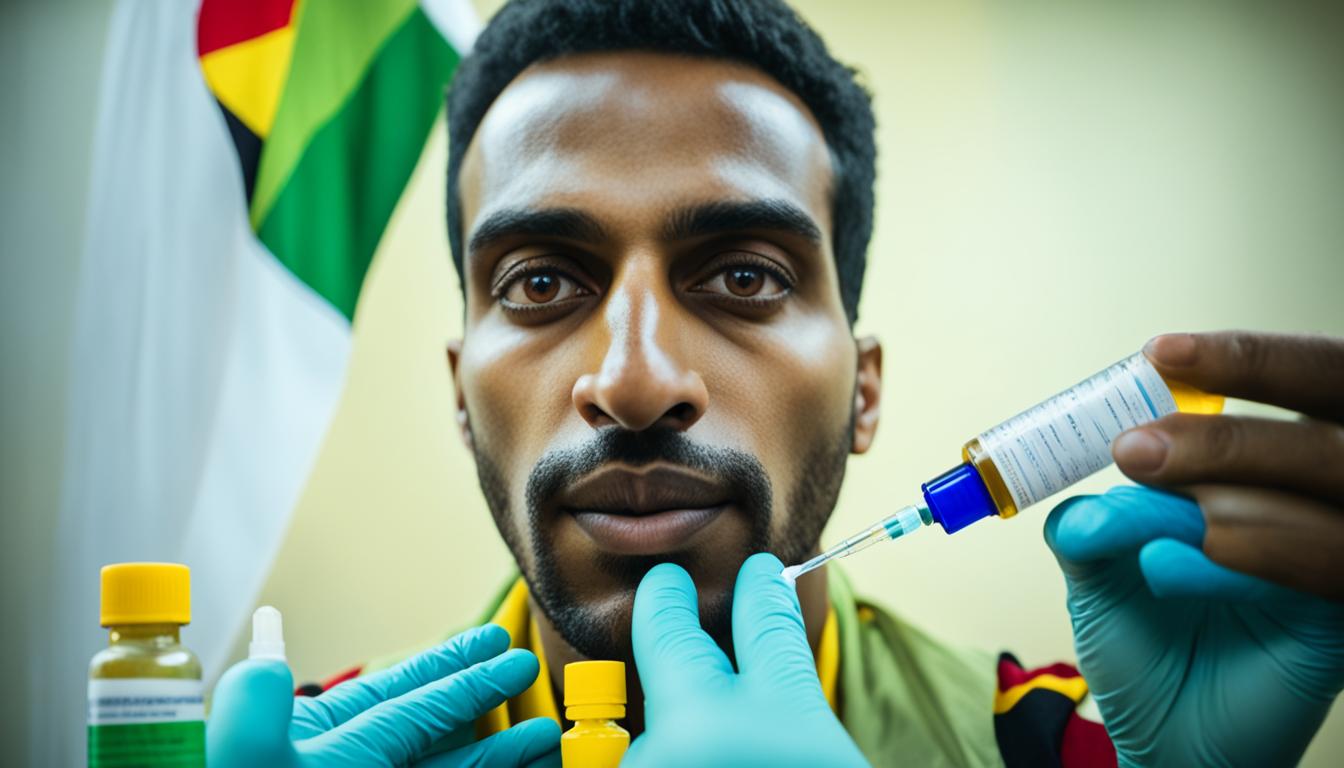Is Yellow Fever Vaccination Required for Ethiopia
Did you know that yellow fever vaccination is a requirement for travelers entering Ethiopia from countries with a risk of yellow fever transmission? This surprising fact highlights the importance of being prepared and informed before embarking on your journey. Whether you’re planning a visit to Ethiopia for business or pleasure, understanding the vaccination requirements and recommendations is crucial to ensure a safe and enjoyable trip.
Key Takeaways:
- Yellow fever vaccination is required for travelers entering Ethiopia from countries with a risk of yellow fever transmission.
- It is important to check the specific entry requirements and recommendations for vaccinations when planning a trip to Ethiopia.
- Other recommended vaccinations for travel to Ethiopia include hepatitis A and B, typhoid, rabies, meningitis, and more.
- Taking necessary health and safety precautions, such as practicing safe food and water habits and preventing bug bites, is essential.
- Transportation safety and climate considerations should also be taken into account when traveling to Ethiopia.
Other Recommended Vaccinations for Ethiopia
In addition to yellow fever vaccination, the CDC and WHO recommend other vaccinations for travel to Ethiopia. These include:
- Hepatitis A and B – Protects against liver infections transmitted through contaminated food and water.
- Typhoid – Guards against typhoid fever, a bacterial infection contracted through contaminated food and water.
- Rabies – Essential for travelers who may come into contact with animals, including bats, dogs, and other mammals.
- Meningitis – Particularly important during Ethiopia’s dry season (December to June) as the country falls within the meningitis belt.
- Polio – Prevents polio, a viral infection that affects the nervous system and can cause paralysis.
- Measles, Mumps, and Rubella (MMR) – Provides protection against these highly contagious viral diseases.
- Tdap (Tetanus, Diphtheria, and Pertussis) – Protects against tetanus and pertussis (whooping cough) infections.
- Chickenpox – Recommended for those who haven’t had chickenpox or the vaccine before.
- Shingles – Recommended for individuals aged 50 and above to prevent shingles, a painful rash caused by the varicella-zoster virus.
- Pneumonia – Guards against pneumonia, a respiratory infection that can be severe, especially for older adults and those with weakened immune systems.
- Influenza – Annual flu shots can help protect against seasonal influenza viruses prevalent in Ethiopia.
It is important to note that COVID-19 vaccination requirements and availability should also be checked with your local Passport Health clinic. Additionally, malaria is a risk in Ethiopia, especially below 2000 meters, and measures such as antimalarials, repellents, and netting should be taken. Consult with a healthcare professional for personalized advice on travel vaccines.
Recommended Vaccinations for Travel to Ethiopia
| Vaccine | Protection Against |
|---|---|
| Hepatitis A and B | Liver infections |
| Typhoid | Typhoid fever |
| Rabies | Rabies virus |
| Meningitis | Meningococcal bacteria |
| Polio | Poliovirus |
| Measles, Mumps, and Rubella (MMR) | Measles, mumps, and rubella viruses |
| Tdap (Tetanus, Diphtheria, and Pertussis) | Tetanus, diphtheria, and pertussis bacteria |
| Chickenpox | Varicella-zoster virus |
| Shingles | Varicella-zoster virus (shingles strain) |
| Pneumonia | Pneumococcal bacteria |
| Influenza | Influenza viruses |
Source: CDC and WHO
Health and Safety Tips for Traveling to Ethiopia

When traveling to Ethiopia, we must prioritize our health and safety by taking certain precautions. The CDC provides valuable recommendations to ensure a safe journey:
- Food and Water Habits: Choose safe food and drinks, avoid consuming contaminated water, and treat water when hiking or camping.
- Bug Bite Prevention: Protect against diseases spread by insects like mosquitoes and ticks. Wear long-sleeved shirts and pants, use appropriate insect repellents, and stay in air-conditioned or screened rooms.
- Weather Awareness: Stay updated on changing weather conditions and prepare for outdoor activities with suitable clothing and protective items.
- UV Radiation Protection: Protect yourself from harmful UV radiation by wearing sunscreen, hats, and sunglasses.
- Water Safety: Be cautious around water sources to avoid infections. Stick to safe swimming areas and be aware of potential risks.
- Animal Safety: Take measures to avoid animals, as they may carry diseases. Do not approach or feed wild animals.
By following these health and safety tips, we can reduce the risks associated with travel to Ethiopia and ensure a pleasant and worry-free experience.
“We must prioritize our health and safety when traveling to Ethiopia. Taking necessary precautions, such as choosing safe food and drinks, preventing bug bites, and staying aware of changing weather conditions, can help us stay healthy and enjoy our trip.”
Health and Safety Tips
| Tips | Details |
|---|---|
| Food and Water Habits | Choose safe food and drinks, avoid contaminated water, and treat water when hiking or camping. |
| Bug Bite Prevention | Wear long-sleeved shirts and pants, use insect repellents, and stay in air-conditioned or screened rooms. |
| Weather Awareness | Stay updated on changing weather conditions and prepare with suitable clothing and protective items. |
| UV Radiation Protection | Wear sunscreen, hats, and sunglasses to protect against harmful UV radiation. |
| Water Safety | Be cautious around water sources, swim in safe areas, and be aware of potential risks. |
| Animal Safety | Avoid approaching or feeding wild animals to reduce the risk of diseases. |
Preventing Illness and Infections in Ethiopia

To avoid getting sick or spreading illness while traveling in Ethiopia, it is crucial to take proactive measures to protect your health. By following these guidelines recommended by the CDC, you can stay healthy and enjoy your trip to Ethiopia:
- Wash your hands frequently: Regular handwashing with soap and water for at least 20 seconds is one of the best ways to prevent the spread of infections. Use hand sanitizers with at least 60% alcohol if soap and water are not available.
- Avoid touching your face: Touching your face, particularly your eyes, nose, and mouth, can transfer germs from your hands into your body. Be mindful of this habit and try to avoid it as much as possible.
- Cover your mouth and nose: When coughing or sneezing, use a tissue or your elbow to cover your mouth and nose. This helps prevent respiratory droplets from spreading and contaminating surfaces or other individuals.
- Avoid close contact: Stay away from people who are sick or displaying symptoms of illness. By maintaining a safe distance, you can reduce the risk of contracting infectious diseases.
- Avoid sharing body fluids: Refrain from sharing drinks, utensils, toothbrushes, or any other objects that come into contact with bodily fluids. This minimizes the chances of transmitting diseases.
- Use latex condoms correctly: If engaging in sexual activity, using condoms consistently and correctly can reduce the risk of sexually transmitted infections.
- Limit alcohol consumption: Excessive alcohol intake can impair your judgment and immune system, making you more vulnerable to infections. Drink responsibly and in moderation.
- Avoid sharing needles or other devices: Sharing needles or other piercing instruments can transmit bloodborne infections. Utilize sterile equipment and avoid practices that can break the skin.
It’s important to be prepared for any health-related situations while traveling. Here are some additional tips:
- Access to medical care: Familiarize yourself with the local healthcare services and emergency contact numbers in Ethiopia. Carry a list of local doctors and hospitals that you can contact if needed.
- Review health insurance coverage: Before your trip, review your health insurance plan to ensure you have adequate coverage while in Ethiopia. Check if your insurance covers medical expenses abroad and consider purchasing travel health insurance if necessary.
- Bring necessary medications: If you have pre-existing medical conditions or require regular medication, ensure that you have an adequate supply of your prescribed medications for the duration of your trip. Carry them in their original labeled containers.
By following these preventive measures and being prepared, you can minimize the risk of falling ill or contracting infections during your travels in Ethiopia.
Transportation Safety in Ethiopia
When traveling in Ethiopia, prioritizing transportation safety is crucial to ensure a safe journey. Motor vehicle crashes pose a significant risk, so it is important to follow certain precautions:
- Use sidewalks and marked crosswalks when walking.
- Pay attention to traffic and be cautious when crossing roads.
- Choose safe vehicles such as official taxis or public transportation with seatbelts.
- Avoid overcrowded or top-heavy buses.
- Avoid riding motorcycles or motorbike taxis.
- Wear seatbelts and sit in the back seat of cars.
- Use helmets when riding motorbikes or bicycles.
- Avoid driving at night whenever possible.
In addition to these transportation safety tips, it is worth noting that landmines are a concern along the western border of Ethiopia. Therefore, it is important to stay within safe areas and avoid venturing into restricted or prohibited regions. Furthermore, tensions resulting from ethnic conflicts can lead to unpredictable situations, so it is advised to stay informed about the local conditions and take necessary precautions.
| Transportation Safety Tips in Ethiopia |
|---|
| Use sidewalks and marked crosswalks |
| Pay attention to traffic and road conditions |
| Choose safe vehicles with seatbelts |
| Avoid overcrowded or top-heavy buses |
| Avoid riding motorcycles or motorbike taxis |
| Wear seatbelts and sit in the back seat of cars |
| Use helmets when riding motorbikes or bicycles |
| Avoid driving at night |
Climate and Safety Considerations in Ethiopia
Ethiopia offers a diverse climate, with weather conditions that vary depending on the region. In the capital city of Addis Ababa, you can expect a pleasant year-round climate, with average temperatures ranging from the 60s to 70s Fahrenheit. However, it’s important to note that different regions, such as Mekele and Adama, may have varying climates due to differences in elevation.
When planning your trip to Ethiopia, it’s wise to pack accordingly to accommodate the weather conditions. If you’re visiting during the wet season, make sure to include rain gear in your luggage. For those planning outdoor activities or hikes, comfortable hiking shoes are a must. Additionally, it’s a good idea to bring along a lightweight jacket for layering, especially if you’ll be venturing into higher elevations.
While enjoying your time in Ethiopia, it’s essential to prioritize safety. The country has experienced instances of terrorism, particularly in the Oromia and Amhara regions. It’s crucial to stay vigilant and take precautions, especially in areas with large gatherings.
“We must stay cautious and aware of potential risks, but Ethiopia remains a beautiful destination with plenty to offer.”
When traveling to Ethiopia, it’s also important to exercise caution when visiting bordering countries. Stay updated on travel advisories and be aware of any potential security risks in those areas. However, it’s worth noting that overall, Ethiopia has a relatively low crime rate, providing a safe environment for travelers.
Conclusion
In conclusion, when planning a trip to Ethiopia, it is important to be aware of the yellow fever vaccination requirements. Travelers entering Ethiopia from countries with a risk of yellow fever transmission are required to have a yellow fever vaccination certificate. It is essential to check the specific entry requirements and recommendations for vaccinations before traveling to Ethiopia. Additionally, other vaccinations may be necessary based on your itinerary and individual health needs.
To ensure a safe and enjoyable trip, it is crucial to take necessary health and safety precautions. Practicing safe food and water habits, such as choosing safe food and drinks and avoiding contaminated water, can help prevent illnesses. Preventing bug bites by using appropriate insect repellents and protective clothing is also essential. Staying updated on weather conditions, following transportation safety guidelines, and being cautious around animals can further contribute to a safe travel experience in Ethiopia.
Remember, the health and safety of travelers are of utmost importance. By being informed and taking necessary precautions, you can have a memorable and worry-free trip to the beautiful country of Ethiopia.






